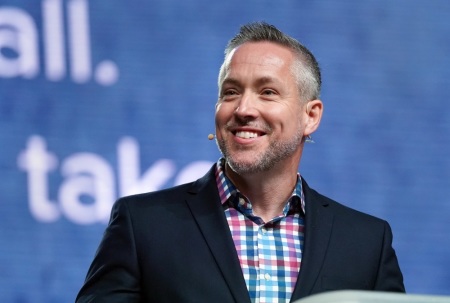SBC Pres. JD Greear says he'll refer to trans individuals by their preferred pronouns

Southern Baptist Convention President J.D. Greear said he would use a trans-identified individual's preferred pronoun and name as a show of “pronoun hospitality," but would also be clear on biblical truth.
The 46-year-old Greear tackled the question of transgender pronoun use on the Nov. 18 edition of his podcast “Ask Me Anything.”
“When talking with a transgender person, which pronoun should you use?” was the question posed to the senior pastor of The Summit Church in Durham, North Carolina.
Greear responded with a long disclaimer that when a question about how Christians should show love to the LGBT community, it is often thought that there can only be two categories: alienation and affirmation.
“Let me just kind of lean on [Baptist ethics professor] Andrew Walker here and the book God and the Transgender Debate,” Greear said. “He points out, and I actually think this is charitable and accurate, that Christians disagree. I think they should disagree charitably about what is the right thing to do specifically with pronoun usage.”
“Some people on one side are going to say, ‘Hey, we got to tell the truth. And the truth is this person is male or female. So I would be lying if I called somebody who is female and identified as male,’” Greear added.
“There are others who would say, ‘Look, as a courtesy, you should refer to a transgender person by their preferred pronoun as sort of a ‘generosity of spirit’ kind of approach. You see evidence in the Bible of that.”
Personally, Greear said he leans “a little bit toward the generosity of spirit.”
“If a transgender person came into our church, came into my life, I think my disposition would be to refer to them by their preferred pronoun when we want to talk about gender,” Greear said. “I will be clear with him on the truth. The question is: Is that the battlefront that you want to choose?”
Earlier in his response, Greear laid out assumptions about the transgender movement and said it is important to answer the question: “What determines gender?”
“The scientific answer and I would say the biblical answer is your genetics,” Greear said. “God made them male and female.”
“Our identity comes from not looking within. Our identity comes from what our Heavenly Father declares over us,” Greear continued.
“That is important at every level of the spiritual life, but it’s important in creation because God declares through DNA male or female. I am not who I feel like I am, I am who God says I am. Jeremiah 17 teaches that our heart is deceitful above all things and desperately wicked, which means the heart is the last place that I want to be looking for my identity.”
Greear cites Preston Sprinkle, head of the Center for Faith, Sexuality and Gender, to layout examples of Christians displaying a “generosity and accommodation of spirit.”
“When missionaries go into tribes where they are polygamous. What do they do when a chief has 10 wives? Do you take the first one and call her a wife and refuse to call anybody else a wife because a man can only be married to one wife?” Greear asked.
“Is that what you do? Somebody who is unlawfully divorced in our culture, Jesus says that they never really relinquished their marriage and that he is actually married to this other woman even though he divorced her. Should you insist on calling the former woman his wife and the current woman adulterous? I think there is a generosity of spirit that you can communicate there.”
When it comes to “generosity of spirit” in the transgender context, Greear said he’s heard it called “pronoun hospitality.”
“That is the way that I would lean in this,” he said. “I would say this is one of perhaps Roman 14 situations where you need to do what your conscience is allowing you to do.”
Greear concluded by assuring that the debate over such a question between Christians should be done so charitably because there is no one-size-fits-all right and wrong answer.
The SBC leader suggested that those who can't in good conscience use the preferred pronoun of a transgender individual should consider avoid using pronouns when speaking with a transgender individual.
A Christian high school teacher who did as Greear suggests and used a trans-identified student's preferred name and avoided using pronouns in the classroom altogether was fired from his job.
“We should be generous of spirit regardless of the way you answer this,” he said. “Two, we should tell the truth. I think those two things are bigger than just the pronoun question. You will apply it to the pronoun question but the bigger thing is to make sure you have those two attitudes as you approach the question.”
In a 2017 op-ed, Walker, a research fellow with the SBC’s Ethics & Religious Liberty Commission, said that he would probably use a transgender individual's preferred name because “names are not intrinsically gendered.”
Walker stressed also that when meeting someone who identifies as transgender for the first time, the name associated with their biological sex will not be known.
However, Walker assured that he will not refer to someone with their desired pronoun in a public venue such as when he gives a speech.
“Those with writing or speaking platforms have an obligation to speak and write truthfully and not kowtow to political correctness or excuse falsehood,” Walker wrote. “This means I will call Bruce Jenner ‘he,’ or if I do say ‘Caitlyn,’ I will still say, ‘him.’”
Greear received push back on social media from other Christian conservatives in response to his podcast.
Conservative columnist and author Rod Dreher wrote in an op-ed that he understands the desire for a pastor to be gracious to people he is trying to evangelize to, but stressed that the “pronoun issue is not merely a matter of courtesy.”
“It means something substantively. The use of language creates social realities,” wrote Dreher, author of The Benedict Option: A Strategy for Christians in a Post-Christian Nation. “Read your Orwell: what we say and how we say it frames the way we perceive and interpret the world. Progressives understand this well, which is why they insist on preferred pronoun usage. By doing so, they are creating ‘facts on the ground.’”
“When religious and cultural leaders concede this territory for the sake of being nice, they surrender more ground than they realize,” Dreher continued. “They are laying down arms in the face of the ideological colonization of our collective moral imagination.”
Follow Samuel Smith on Twitter: @IamSamSmith
or Facebook: SamuelSmithCP





















